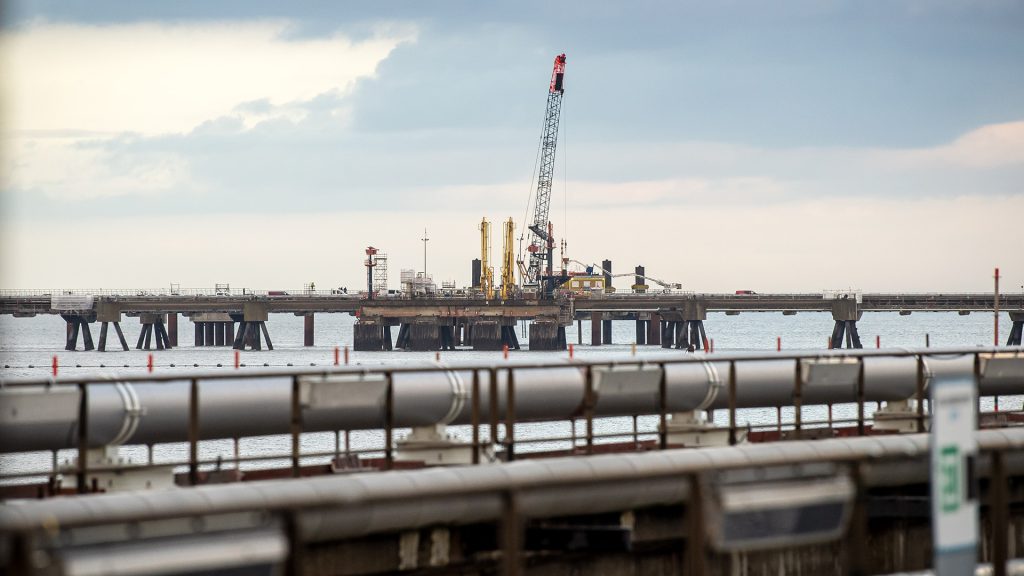Status: 12/17/2022 8:38 AM
Ceremony in Wilhelmshaven: Germany’s first floating LNG import terminal will be commissioned in the morning. While environmentalists announced lawsuits, Economics Minister Habek defended his energy policy in daily topics.
In the presence of Federal Chancellor Olaf Scholz, the first German import terminal for liquefied natural gas (LNG) will be opened in Wilhelmshaven in the morning. Also present at the ceremony were Economics Minister Robert Habeck, Finance Minister Christian Lindner and Prime Minister of Lower Saxony Stefan Weil.
The floating terminal off the North Sea coast in Lower Saxony is intended to help fill a gas supply gap in Germany caused by a shortage of shipments from Russia. Four more stations will be built at Brunsbüttel, Stade and Lubmin by the end of next year. According to the Economics Ministry, together they could absorb a third of the volume of natural gas required to supply Germany.
The Confederation of German Industries (BDI) warned against exaggerated euphoria: the risk of a gas shortage has not yet been averted with the new plant.
Scholz is hoping for more supply contracts
Chancellor Olaf Scholz told the Süddeutsche Zeitung that he would press ahead with building more LNG terminals next year, and hoped for more supply contracts. “The federal government is in constant contact with gas importers, and it is also promoting the conclusion of long-term contracts,” he said.
According to the chancellor, gas from Norway, the United States, the Gulf region and the Netherlands will also secure supplies for Germany in the winter of 2023/24. “We can assume that, like this year, if nothing unexpected happens,” Schultz says. For the winter of 2022/23, he has already confirmed several times that there will probably not be a shortage.
Habik: Defense in an emergency is of absolute priority
Economy Minister Robert Habeck defended it in an interview with daily topics its energy policy. He said that “avoiding an emergency is an absolute political priority” regarding a possible gas shortage. The government had “decided wisely, reacted firmly, and managed to do something that was rightly considered impossible in the middle of the year”.
The minister explained that after the loss of the Nord Stream 1 pipeline, Germany will lose about half of the gas it needs. Without the new infrastructure, Germany will face a gas shortage. And this will immediately lead to the collapse of the German economy and society’s support for Ukraine. ”
Therefore, the Minister of Economy rejected the accusation of climateists that Germany is creating excess capacity for gas and is obstructing the path to climate goals. Habeck’s paradox: “It’s not possible to talk about excess energy” daily topicsHe pointed out that the stations guarantee only a third of German consumption.
Compared with the Nord Stream 1 pipeline, floating LNG terminals can also be used more flexibly. Ships could continue to be chartered when they were no longer needed. “And we’re building all hydrogen-ready infrastructures, which means that the terminal stations we build can — once there’s enough hydrogen available — convert to another climate-neutral energy source.”
Environmental Aid announces legal action
German Environmental Aid announced further legal steps to achieve a time limit for the process. The first lawsuit is already pending. “The climate crisis and the energy crisis should not be played against each other,” said DUH Federal Director Sascha Müller-Kreiner. He fears that the targeted reduction of climate-damaging gas emissions could be jeopardized by excessive imports of LNG.
Last but not least, large amounts of biopesticides were allowed, but should be prohibited. The organization said that the Ministry of Health “will implement all this by legal means if necessary.” Habeck was confident that approval of the stations would withstand lawsuits.
Because the transition will take years
According to Lower Saxony Prime Minister Stefan Weil, the complete conversion of import LNG terminals into climate-neutral gas will take years. The advantage of climate-neutral hydrogen, which will also be imported via LNG plants in the future, is that you can “moderate the transition.” “Climate neutral hydrogen can be added incrementally by adding natural gas,” Weil said.
Gas will flow starting Thursday
The special ship “Höegh Esperanza” required for the station arrived in Wilhelmshaven on Thursday. So-called Floating Storage and Regasification Units (FSRUs) take liquefied natural gas (LNG) from tankers and gasify it while they are on board. Then it can be entered into the network. The “Höegh Esperanza” has been leased by the federal government.
Uniper Group operates the LNG terminal on behalf of the country together with partner companies. According to the group, gas will be pumped into the German pipeline network from Thursday.

“Food practitioner. Bacon guru. Infuriatingly humble zombie enthusiast. Total student.”








More Stories
Kyiv: Russian Kursk offensive halted
US Presidential Election: Former US Government Officials Warn Against Donald Trump's Election
Netherlands wants to leave asylum system